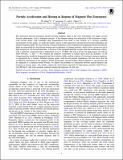Particle acceleration and heating in regions of magnetic flux emergence
Abstract
The interaction between emerging and pre-existing magnetic fields in the solar atmosphere can trigger several dynamic phenomena, such as eruptions and jets. A key element during this interaction is the formation of large-scale current sheets, and eventually their fragmentation that leads to the creation of a strongly turbulent environment. In this paper, we study the kinetic aspects of the interaction (reconnection) between emerging and ambient magnetic fields. We show that the statistical properties of the spontaneously fragmented and fractal electric fields are responsible for the efficient heating and acceleration of charged particles, which form a power-law tail at high energies on sub-second timescales. A fraction of the energized particles escapes from the acceleration volume, with a super-hot component with a temperature close to 150 MK, and with a power-law high-energy tail with an index between −2 and −3. We estimate the transport coefficients in energy space from the dynamics of the charged particles inside the fragmented and fractal electric fields, and the solution of a fractional transport equation, as appropriate for a strongly turbulent plasma, agrees with the test-particle simulations. We also show that the acceleration mechanism is not related to Fermi acceleration, and the Fokker–Planck equation is inconsistent and not adequate as a transport model. Finally, we address the problem of correlations between spatial transport and transport in energy space. Our results confirm the observations reported for high-energy particles (hard X-rays, type III bursts, and solar energetic particles) during the emission of solar jets.
Citation
Isliker , H , Archontis , V & Vlahos , L 2019 , ' Particle acceleration and heating in regions of magnetic flux emergence ' , Astrophysical Journal , vol. 882 , no. 1 , 57 . https://doi.org/10.3847/1538-4357/ab30c6
Publication
Astrophysical Journal
Status
Peer reviewed
ISSN
0004-637XType
Journal article
Description
L.V. was partly supported by the European Union (European Social Fund) and the Greek national funds through the Operational Program "Education and Lifelong Learning" of the National Strategic Reference Frame Work Research Funding Program: Thales. Investing in Knowledge Society through the European Social Fund. V.A. acknowledges support by the Royal Society.Collections
Items in the St Andrews Research Repository are protected by copyright, with all rights reserved, unless otherwise indicated.

